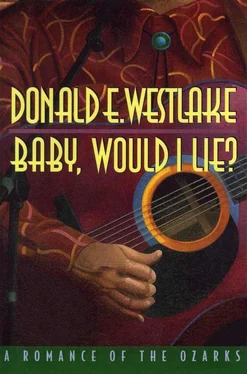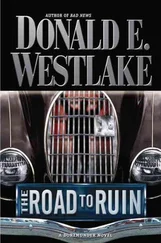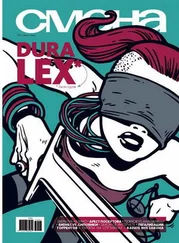Mute, Del pointed at Jack, who came forward, smiling amiably, and held up a photo for Delray to look at. “His name,” Jack said, “is Louis B. Urbiton. He’s Australian originally, and he’s a reporter for the Weekly Galaxy .”
“What?” Delray blinked but clung to previous certainties. “He is not. His name is Fernit-Branca. He’s with The Economist ; that’s an English magazine.”
Jack held up a second photo. “Here’s Louis B. Urbiton with his Weekly Galaxy editor, a man named Boy Cartwright.” Another photo. “Here are Louis B. and Boy entering the house on Cherokee the Galaxy rented for the duration of the Ray Jones trial. Here’s another picture of the house; that’s a fellow named Bob Sangster, also a reporter with the Galaxy . Here’s a picture of the shadow jury the defense has been using. I guess you know about that. Recognize that fellow there?”
“Let me see that!”
While Delray stared at damning photo after damning photo, many of them with his own dumb and happy face clearly identifiable. Jack took from his inner jacket pocket a slender document, which he dropped on Del’s desk: “Here’s an affidavit from a maid at the Mountain Greenery Motel in Branson, named Laverne Slagel, stating that she was paid bribes by Bob Sangster and by a woman employee of the Weekly Galaxy named Erica Jacke to pass on to Miss Jacke from Mr. Sangster the audiotapes he was making at the shadow-jury sessions. She was told they were love letters. You have pictures there of the two women exchanging tape and money in the motel parking lot.”
“My God!” Delray spread photos out on his secretary’s desk, then leaned on the desk, the better to hold himself up while studying them. “What were these people doing ?”
“Going too far, I hope,” Jack said. “By the way, I’m Jack Ingersoll. I’m an editor with Trend . We’re a magazine up in New York. You’ve heard of us?”
Delray, too late suspicious, frowned at Jack. “I’d like,” he said, “to see some identification.”
“Louis B. showed you identification,” Jack said, grinning cheekily at him. “You don’t want identification; you want to know what’s going to happen next.”
“All right,” Delray said, being guarded and wary now that it was all over. “What’s going to happen next?”
“One of two things,” Jack told him. “As you can see from those pictures, all the other people the Weekly Galaxy dealt with were completely taken in. Either I write the story that way, that everyone was taken in, or it turns out that you knew what was up the whole time and were just stringing them along until the time was right to make a number of arrests.”
“I see.” Delray turned and leaned his butt on his secretary’s desk. He thought a while. “There are certainly some misfeasances here,” he decided.
“Mmm.”
Delray squinted at Jack. “When am I going to think the time is right to close in on these people?”
“ Trend publishes on Friday. My deadline is nine A.M. Thursday, tomorrow morning. If you planned some predawn raids and arrests, I could have Trend staffers and photographers ready to accompany your men.”
“You want an exclusive.”
“Oh, I’ve got an exclusive,” Jack said, “one way or the other.”
Delray pondered, scratching some of his chins. “We’ll need a judge tonight, give us the warrants. We’ll need to do a bunch of paperwork between now and then, without letting the word get out.”
“I stand ready to assist in any way I can,” Jack assured him.
Suddenly decisive, Delray rose from his secretary’s desk and said, “Come into my office.”
“I’ll bring the pictures,” Jack said, starting to gather them up.
“God yes! And Del?”
“I know,” Del said. “Mum’s the word.”
“Double mum,” Delray told her. “And hold all my calls.”
He was already going through into his inner office, Jack following, when Del called after him, “You’ll want me to tell you if the jury comes back, won’t you?”
Delray couldn’t have cared less about any jury. Pausing in the doorway for a fraction of a second, he said, “Uh... uh... yes, of course. Come on in,” he said to Jack. “What did you say your name was?”
“Jack.”
“I’m Buford.” And the door closed.
The change in the atmosphere of the shadow jury had come, of course, with “My Ideal,” on Tuesday, which was probably a worse experience for them than for the real jury, because, in fact, one significant difference between the two juries was that the shadows knew they were being paid by the defense, had been hired by the defense to help in their strategies, their efforts to win a verdict of not guilty . However dispassionate they might try to be, the shadow jurors couldn’t help but think of themselves as part of the defense team , rooting for their side to win.
This had not been a problem for the shadows at first. Riding over to Forsyth from Branson in the bus Tuesday afternoon, they’d still been cheerful, chatting, optimistic. Riding back Tuesday evening, after seeing and hearing “My Ideal” on the day’s videotape of the court proceedings, they had been as silent as, well, as the tomb.
And Wednesday was worse. As several of them commented after watching the tape, they hadn’t thought much of Fred Heffner’s summation, they’d seen pretty clearly that he was blowing smoke, and though they’d found Warren’s arguments interesting, they weren’t really all that persuasive; sorry, Warren. No, what they all remembered, not happily, was Ray’s interjection in the middle of the sandwich: “If Belle Hardwick was a saint, I’m the Pope.”
It just stuck in everybody’s craw. “I’m sorry Ray said that,” admitted Juggs, the retired postal worker, and several of the other jurors nodded agreement, more in sorrow than in anger, among them the fellow not really named Jock O’Shanley.
Yes, the cuckoo bird from the Weekly Galaxy was still among the shadows. On balance, despite the shameful falsity of his presence here, he was pretty much giving good weight, doing a credible Jock O’Shanley imitation, commenting as that Irishman would, reacting as O’Shanley might be expected to react. It had finally seemed that to remove him would be more disruptive to the jury as a whole than to leave him in place and leave the rest of the jurors ignorant as to the truth about him, so that’s what had been done — for now.
Warren led a brief discussion, briefer than usual because there was no more strategy to be considered. The war was over. All that was left was to choose which brow would get the laurel.
So, after just a few minutes of chitchat, Warren said, “Let’s see if we can get a sense of where we are here. I want to do a first, very preliminary vote. Not a show of hands. I want this one to be anonymous, so you can make your decision without being asked to defend it. You’ve all got your pads and pencils. I’d like each of you to write one letter on a sheet of paper and fold it so the rest of us can’t see it. Then toss it into the middle of the table. If you were on the regular jury, across the street there, would you vote guilty or not guilty? Write G if you’d vote guilty; write N if you’d vote not guilty.”
They did it. A few of them had to think it over first, but a depressingly large majority had no trouble at all deciding which letter to write. Then, when all fourteen folded pieces of paper were in the middle of the table, Jim Chancellor gathered them and opened them and tallied the vote.
Five N . Nine G .
NG: not good.
Читать дальше







